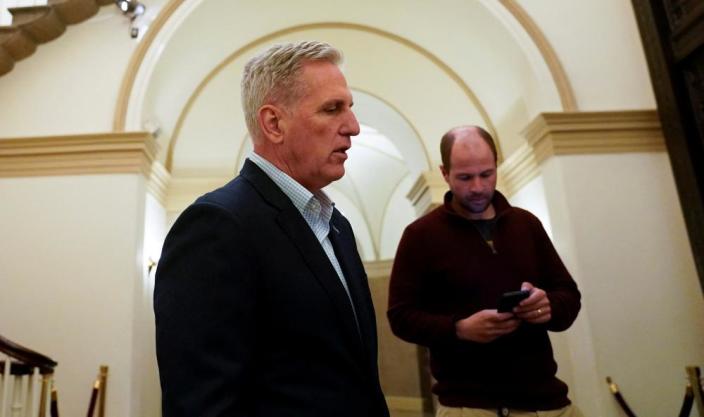Joe Biden and Republican House Speaker Kevin McCarthy have reached a tentative agreement to raise the federal government’s debt ceiling to $31.4 billion, with America just days away from default. .
Biden on Saturday called the deal “an important step forward” and called it a compromise that nonetheless protected Democrats’ top priorities.
“The deal represents a compromise, which means not everyone gets what they want,” he said in a statement. “It is the responsibility to govern.”
McCarthy said there was still “a lot of work to do” but called it a deal “worthy of the American people”.
Related: What is the US debt ceiling and what would happen if it were not raised?
Biden and McCarthy held a 90-minute phone call earlier Saturday night to discuss the deal.
Full details of the deal have not been confirmed, but it has been reported that the deal will raise the debt ceiling by two years, thus avoiding any further deadlock until after the 2024 presidential election.
“This is an important step forward that cuts spending while protecting essential programs for workers and growing the economy for all,” Biden said, saying the legislation was still being finalized, though urging Congress to pass the bill.
According to McCarthy, there are no new taxes and the bill includes “historic spending cuts, meaningful reforms that will lift people out of poverty and into the workforce.”
“I plan to finish drafting the bill, check with the White House and speak to the president again tomorrow afternoon, then release the text tomorrow, and then we’ll vote on it on Wednesday,” McCarthy said. .
The deal has yet to receive approval from the divided Congress, and McCarthy will likely need the support of Democratic members to push the proposal through the House, given the narrow majority of Republicans in the lower house.

The deal would avert an economically destabilizing default that the Treasury Department says would occur if the debt ceiling is not raised by June 5.
Republicans who control the House of Representatives have pushed for deep spending cuts and for funds to be withdrawn from the Internal Revenue Service, the US tax agency.
Both sides suggested that one of the main delays had been a Republican effort to increase work requirements for recipients of food stamps and other federal assistance programs, a longtime Republican goal that many Democrats vigorously opposed.
Exact details of the final deal were not immediately available, but negotiators agreed to cap non-military discretionary spending at 2023 levels for two years, in exchange for a debt ceiling increase over a similar period. , sources told Reuters earlier.
Both sides must carefully thread the needle to find a compromise that can clear the House, with a 222-213 Republican majority, and the Senate, with a 51-49 Democratic majority.
The long stalemate spooked financial markets, weighing on stocks and forcing the United States to pay record interest rates on some bond sales. Economists say a default would have a much heavier impact, likely plunging the country into recession, shaking the global economy and leading to soaring unemployment.
Biden has refused for months to negotiate with McCarthy on future spending cuts, demanding that lawmakers first pass a “clean” increase in the debt ceiling without further conditions, and present a 2024 budget proposal to counter its publication. in March. Bilateral negotiations between Biden and McCarthy began in earnest on May 16.
Democrats have accused Republicans of playing a dangerous game of tightrope with the economy. Republicans say recent increases in government spending are fueling growing US debt, which is now roughly equal to the economy’s annual output.
McCarthy pledged to give House members 72 hours to read the bill before putting it to a vote. This will test whether enough moderate members support the bill’s compromises to overcome opposition from far-right Republicans and progressive Democrats.
Then he will have to move on to the Senate, where he will need at least nine Republican votes to succeed. There are multiple opportunities in each room along the way to slow down the process.
